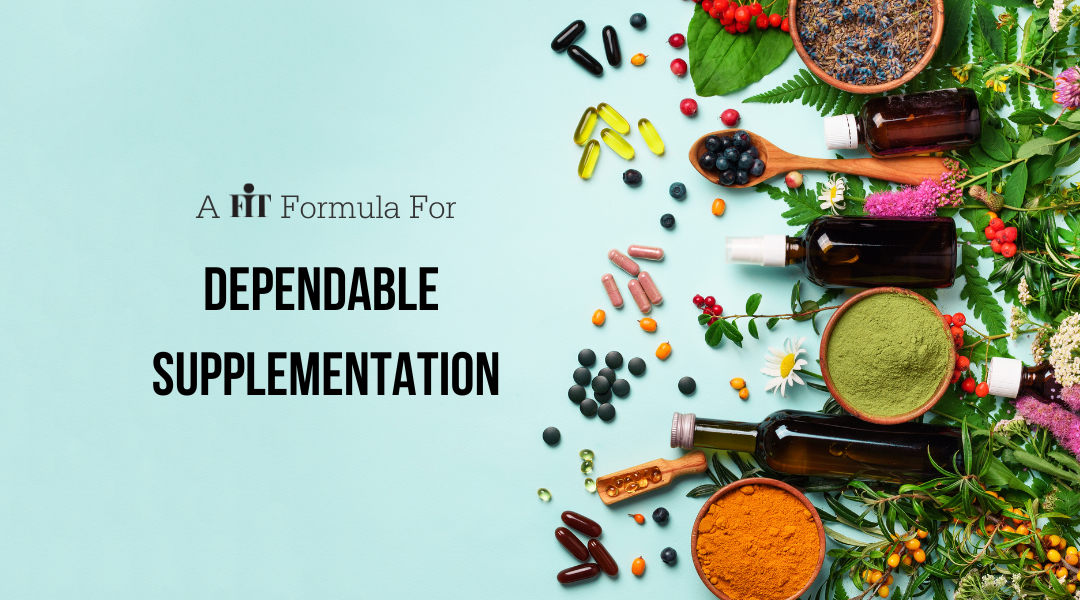A Longevity Based Paradigm
Since 2020, vitamin and supplement usage has risen dramatically, 12.1% in 2020 alone, as more people than ever are focused on improving their health and wellness. Products that claim to boost immunity, lower stress and slow aging are all the rage. But as the medical establishment continues to evolve in the direction of a more preventative, longevity based paradigm, the onus falls to the consumer and allied health professionals to fill the information void with regard to supplementation. Our goal here is to help you determine when supplementation may be appropriate, learn how to navigate the process, and introduce some well researched supplements that could provide powerful benefits.
Complement, Rather than Complicate
There are plenty of circumstances where a healthy individual may benefit from supplementation. However, before researching clean, independently tested, non-GMO, etc, it’s important to evaluate where deficiencies lie or what could help you to achieve a particular objective. This is by no means an attempt to dissuade you from taking supplements, but rather to encourage you to choose supplements that will complement, rather than complicate, your eating strategy.
Know your Reality
In 2023, the supplement industry is projected to reach 39.8 billion dollars in revenue. Health and wellness products that promise inimitable outcomes can be found in all forms, yet the most effective ways to improve health are often simple and free. A well-varied eating strategy rich in vegetables and healthy fats is a great place to start, however, even those practicing healthy lifestyles will likely benefit from some degree of supplementation. For example, fish, krill, and plant based omega 3 oils in particular offer many benefits making supplementing this nutrient a no brainer. The standard American diet typically contains an unbalanced amount of omega 6 and 9 fatty acids so balancing these ratios with omega 3 becomes important for a number of potential health benefits. Consuming the minimum effective dose from whole foods while avoiding the negative contaminants such as mercury is difficult if not impossible. Or, in the case of Vitamin D, supplements offer an alternative in areas of the world that lack sunlight for a large portion of the year. Generally speaking, supplements offer nutrients in higher concentrations than can easily be found in nature making them readily available and easy to consume.
In the majority of situations, however, an assessment of lifestyle areas that could be improved upon will reduce the need to supplement in order to derive the benefits. In other words, assess what you can control prior to relying on supplementation. For example, look to improve your sleep hygiene before turning to sleep supplements. Again, supplementation can be beneficial but should not be a crutch nor a ‘hack’ for less than healthy behaviors.
Food First, Supplementation Second
Dr. Andy Galpin, professor of Kinesiology at Cal State Fullerton, sets a goal to get his athletes where they need with as little supplementation as possible. Galpin’s objective is for his athletes to be situated such that lifestyle, sunlight, sleep, physical activity, stress management, hydration and whole food nutrition provide almost everything required to derive the desired health and performance. We can all benefit from efforting to level up in these aspects of our lifestyle since no supplement will provide more benefit than improving these areas naturally.
Once you have begun attending to the aspects of your lifestyle that need attention, be aware that genetics and your environment could mean that you need more or less nutrients than someone else. For example, women entering their 50’s may be more in need of nutrients that support bone health such as calcium and Vitamin D3 taken with K2 to maximize absorption.
As with anything, the key to positive results is consistency. If you are open to the idea of supplementation and willing to be consistent. To determine if you are truly deficient in a particular nutrient, see a functional medicine doctor and get saliva, blood, stool, or other tests that accurately show these ranges whereby a plan of action can be created to bring nutrient levels into range. Comparing what you eat to the government reference daily intake (RDI) is not a bad start, but these numbers can have a margin of error of up to 15% for fat soluble vitamins. Not to mention you would have to be very good at tracking your food to reduce error. It may seem inconvenient or unnecessary to see your doctor for a blood test, but the information gleaned could be invaluable to setting you on the right path towards better health.
FiT Recommended Supplements
While lifestyle adjustments can and should account for roughly 80% of your health promotion efforts, carefully selected supplements can support and help with the remaining 20% in a variety of ways – by filling in nutritional gaps, boosting performance or aiding in recovery. Here are three powerful supplements that cover these bases and are among some of the most well researched supplements available. We’ve also included what lifestyle aspects these tend to improve with regular usage.
Liposomal D3/K2
- Better absorption and bioavailability than traditional D3
- Needed for bone, teeth and muscle health
- Calcium absorption
Lifestyle: Time outdoors, seasonal
Broad spectrum Magnesium
- Promotes Healthy Sleep
- Assists Bone Health
- Supports a Positive Mood
- Supports Healthy Blood Pressure
Lifestyle: Sleep hygiene
B complex
- Cell health
- Growth of red blood cells
- Energy levels
- Eyesight
- Brain function
- Digestion
- Appetite
- Nerve function
Lifestyle: Stress Management
Omega 3 (fish oil, krill oil, cod liver oil, algal oil)
- Lower elevated triglyceride levels
- May curb stiffness and joint pain
- Support Cardiovascular Health
- Important for Brain Health
- May Boost Immunity
- Contributes to eye health
- Contributes to skin health
- Improve mood in people with major depressive disorder
Lifestyle: Eating Strategy
These nutrients are readily available in a well balanced, varied diet, however it can be difficult to consume them in the concentrations that are most beneficial which is where supplementation can help.
How to Research and Decide
If you determine that supplementation might be in order for you, start slowly and look for the fewest supplements that offer the most benefit (hint: 2 have already been shared).
Equally important, if you are taking prescription medications or have health concerns, you should speak with your physician or pharmacist to ensure there are no drug interactions that could be harmful. Since we are not a medical facility, none of the information provided here is meant to be taken as medical advice.
Consumers can find ample information about supplements on the internet or social media, but its veracity is sometimes questionable. The difficulty for consumers and health professionals is identifying web sites that provide accurate, reliable and unbiased information. A few well vetted and reliable resources are listed below for you to try..
NIH Office of Dietary Supplements
Dietary Supplement Ingredient Database (DSID)
Experiment
Hopefully it’s obvious by now that taking a new supplement should not be an impulsive decision, rather one that carefully weighs the risks versus potential benefits.
Nearly every aspect of your reality has a role to play in how your body will respond to a particular supplement. With this in mind, choose supplements carefully, but recognize that you are experimenting and may get mixed results.
Try to avoid making significant changes to your eating strategy concurrently with starting a new supplement. This can lead to confusion and mixed results, with no clear road back to the source of the problem.
Analyze
Be sure to stay consistent with taking the supplement to see if it is providing any benefit. One example of this is creatine, which needs some time to build up in the body.
To fully understand the effect a particular supplement has on your physiology, a barrage of tests could be required, yet most people would not spend the time or money on this approach. Instead, it’s important to listen to your body and keep track of relevant information or data that will aid in reaching your objectives. Whether that is a sleep journal, sports performance data, or blood test results, recognize that these will not tell the whole story, but are still useful to getting a more birds eye view of your results.
Adjust
Finally, make adjustments when necessary and discontinue supplements that are not working or have undesirable side effects.. Stay positive and keep working towards the best overall strategy for you.
Summary
We hope you are now better prepared regarding how to approach and think about adding supplements to your eating strategy.
Taking stock of your current reality and working to improve important lifestyle factors is the first step. Recognize that supplements are never a replacement for a balanced and varied eating strategy.
Once you are ready, research and choose the best in class supplements that you deem appropriate, but don’t forget to check in with your doctor about any potential contraindications.
Be sure to stay consistent with taking them, while analyzing your results and making adjustments along the way. With this strategy we believe supplements can help get you closer to achieving your objectives.
Disclaimer:
None of the information shared here should be construed as medical advice. Be sure to consult your doctor prior to taking any supplement.
References:



















